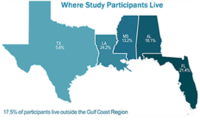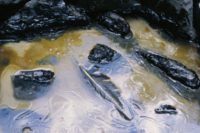 The National Institutes of Environmental Health Sciences (NIEHS) is making a final call for volunteers for its study on potential health effects experienced by people who helped clean up the Gulf area after the 2010 Deepwater Horizon disaster.
The National Institutes of Environmental Health Sciences (NIEHS) is making a final call for volunteers for its study on potential health effects experienced by people who helped clean up the Gulf area after the 2010 Deepwater Horizon disaster.
After 18 months, the enrollment phase of the GuLF STUDY (Gulf Long Term Follow-up Study) is drawing to a close, and the NIEHS is still seeking clean-up workers and volunteers who’d like to participate in the study – particularly those who worked near the source of the spill
Since March 2011, the GuLF STUDY has enrolled more than 28,000 participants with the help of over 80 community and professional groups across the Gulf. The study is designed to answer health questions that matter to affected communities. The results of the study may help inform policy decisions on health care and health services in the region and may also influence responses to other oil spills in the future. The oil spill clean-up response involved a wide range of tasks that were carried out by a large number of people from the Gulf region and other parts of the United States. The GuLF STUDY seeks to understand the experiences of all types of workers and to follow their health over time.
“Every worker has a story to tell, and every story can help inform this study,” according to the NIEHS. “All workers and volunteers are encouraged to join the study, whether they are healthy or experiencing health problems, before the enrollment period ends.”
The GuLF STUDY is funded by the National Institutes of Health (NIH).
Anyone interested in participating in it should contact Katie Fauquier at kfauquier@deveney.com.
Additional information about the GuLF STUDY may be obtained by calling toll-free at 1-855-NIH-GULF (1-855-644-4853) or visiting www.gulfstudy.nih.gov .








